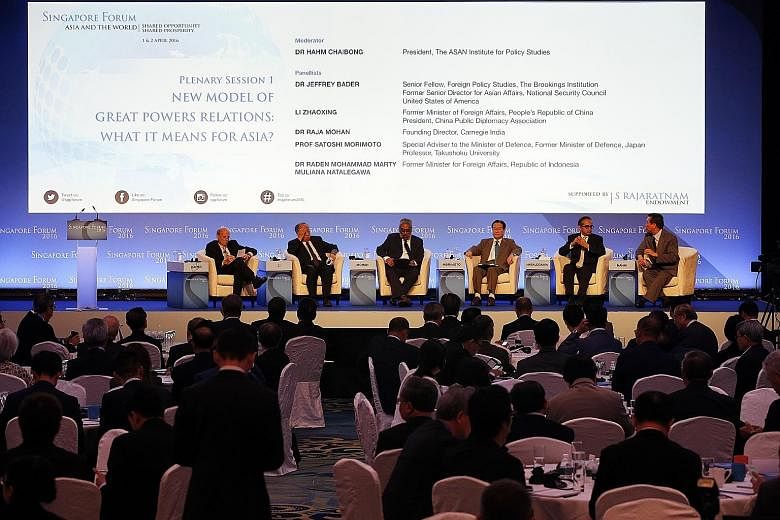China accuses the United States of "overreacting" and adding to the tensions in the South China Sea, while the US says China's maritime claims are "ambitious, ambiguous and, in some instances, legally questionable".
This war of words was played out between former Chinese foreign minister Li Zhaoxing and Dr Jeffrey Bader, a former principal adviser on Asia to US President Barack Obama. They were speaking to 250 business leaders, politicians and thought leaders, on the second of the two-day Singapore Forum on Asia's development held by the S. Rajaratnam Endowment.
But they pointed out that the two sides have common interests in Asia and are unlikely to go to war.
Other experts on the panel, discussing what a new model of great power relations means for Asia, urged practical approaches from Asean and other regional players to reduce tensions and build trust.
In his remarks, Mr Li said the South China Sea situation, in which China has overlapping territorial claims with several Asean states, has become a flashpoint between China and the US.
-
Security council within EAS?
-
The 18 countries that are part of the East Asia Summit (EAS) should work together to establish a peace and security council within the grouping's auspices, former Indonesian foreign minister Marty Natalegawa said yesterday.
He said the EAS has the potential to be more than just a "hello-and-goodbye forum" which is "procedural and informal in nature".
Currently, leaders meet once a year and there is also an annual Foreign Ministers meeting, he noted at the Singapore Forum.
Having such a council within the EAS - which gathers Asean states, China, the United States, Russia, Japan, India, South Korea, Australia and New Zealand - will allow countries to "deal regularly with issues and developments in the region". This would promote a spirit of cooperation, he said.
Dr Natalegawa offered this suggestion at a panel discussing what a new model of great power relations - particularly between the US and China - means for Asia.
He argued that Asean, as a bloc, needs to take a more proactive role by proposing concrete ideas on how issues and disputes in the region should be managed. "Otherwise, we will just become passive observers or even worse, victims of great power relationships," Dr Natalegawa said.
He called for confidence and trust to be built up among regional countries, and for the EAS to commit to a treaty to renounce the use of force in settling disputes.
He said there is a need for a platform to address and manage crises without allowing them to proliferate. Having such a council within the EAS, such that countries can thrash out their problems, is all the more important at a time when "unfortunately, the great powers are not behaving in a great way and maybe in an irresponsible way", he said.
Walter Sim
He argued that China's efforts to reclaim land and build islands are "within our territorial sovereignty". "Yet the US is oversensitive and has overreacted, pressing other countries to pressure China and therefore adding to tensions in the South China Sea," he said.
"China has been accused of militarising, yet some of the neighbouring countries have also engaged in building airports and offensive weapon systems. But the US chooses to turn a blind eye."
He said the sentiment was due to a "Cold War mindset" of some US politicians - that a rising power like China is bound to seek hegemony in world affairs. This is not the case, he said, and China is "committed to peaceful development".
But Dr Bader countered that China's maritime claims have been "ambitious, ambiguous and in some instances, legally questionable". He said China no longer follows the "great wisdom" of restrained foreign policy advocated by the late Deng Xiaoping.
"Until China settles on a new equilibrium based on a framework just as wise, it would appear that there will be frictions, expectations of a strong US military presence on the part of our allies and partners," he said. "And I would stress a positive response by the US to such expectations."
Japan, which is itself embroiled in a territorial dispute with China in the East China Sea, is standing with its US ally on this issue.
Former Japanese defence minister Satoshi Morimoto said Chinese actions in building military assets and deploying soldiers in the South China Sea have been "absolutely inconsistent" with what Chinese President Xi Jinping said in Washington last September. Mr Xi had said China would not use reclaimed land for military purposes.
Professor Morimoto added: "Most Asian countries are worried about China's militarisation to change the status quo by use of force and we will be involved in a possible conflict between major powers in the Asia-Pacific region."
With Sino-US ties in flux, foreign policy analyst Raja Mohan of Carnegie India said Asia must be prepared to deal with a "fundamental change in the structure of power in this part of the world".
"We have to take more responsibility," he said. "We don't have the luxury of merrily saying that the Chinese would do the right thing, and then criticise them for whatever they do or don't do."
He called on emerging countries like India and Indonesia to take the lead in constructing new institutions that will stabilise Asia.


